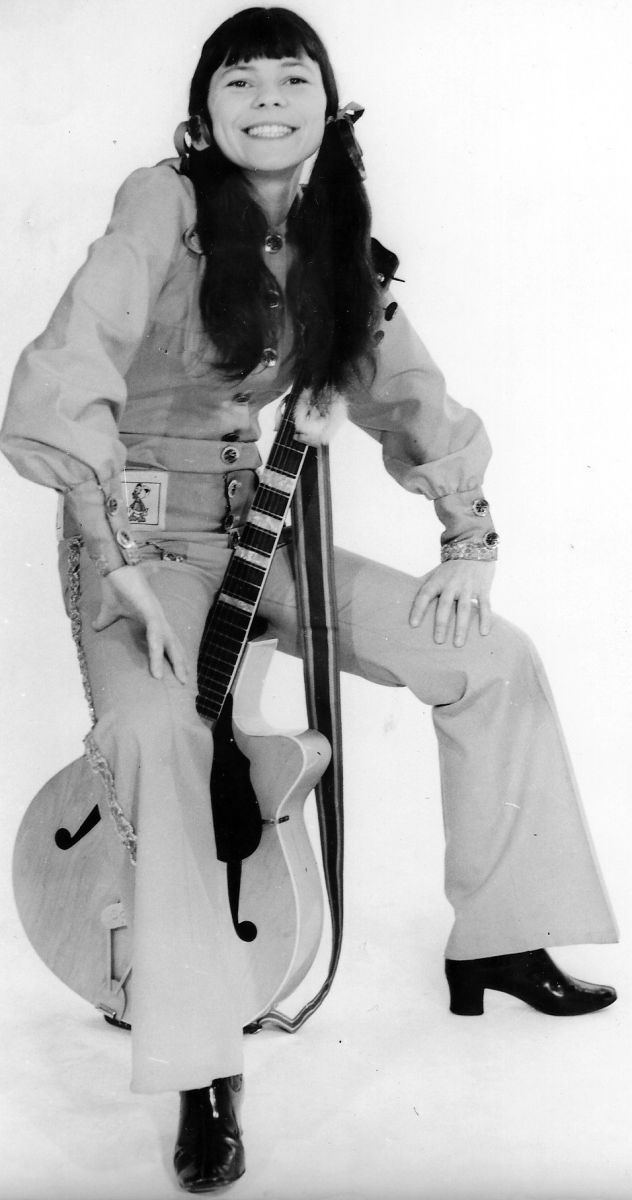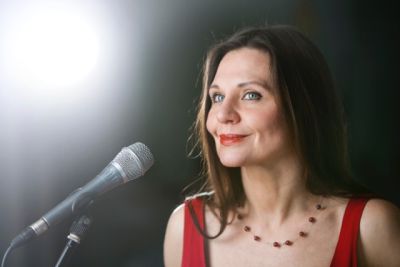Karin Stanek. The girl with the guitar
Mediathek Sorted























A brief comeback
In 1974, after a long tour through the USSR, thanks to the efforts of her manager, Karin received an invitation to perform at the first Polish Stage Fair (Polskie Targi Estradowe) together with the band Schemat. In addition, Anna Kryszkiewicz succeeded in organising recordings of songs by the local radio station, Radio Poznań. For her client, these were the first radio recordings for years. Karin recorded four new songs, which would later only be played on the radio a few times. Her participation at the fair also didn’t go well. Her first performance was right at the beginning of the evening, when the audience were still looking for their seats. Under these circumstances, it was impossible to interact and receive feedback. Her second concert was scheduled for just before midnight, when the young audience had already gone home. She also had similar bad luck when she took part in the 1974 Song Festival in Opole. What in her mind was a successful, enthusiastically received performance was, to her surprise, excluded entirely from the television broadcast. Furthermore, the press reviews were also not exactly flattering.
“The only positive review of the festival was published in the GDR. After I returned from Opole, I decided once and for all that this would be my last performance at such an event. There was no point in making the effort. I received nothing but trouble for my work. What was the point of it all?”[6]
In the period that followed, Stanek focused on performances outside Poland. In 1975, she was invited to around 110 concerts abroad. In 1976, she was even offered 120 gigs in Dresden. Yet before she was about to start work with the event organiser in the GDR, it emerged that she did not have permission from the Polish agency Pagart. The opportunity to give concerts in East Germany for a whole year was lost.
Western Europe and the US
In December 1976, Karin Stanek performed concerts in Vienna, where she was well received. During her stay there, she had the opportunity to meet her mother, who had travelled from the Federal Republic of Germany, where she now lived. She would later regard this meeting as a traumatic experience. Her mother urged her to remain in the West and to join the family in West Germany. However, Karin was convinced that she belonged in Poland, since she could develop musically there. And in fact, on her return, there was indeed a positive development. She was invited to participate in recordings at the television studios near Wrocław. Her old contacts with East Berlin were also revived. In March 1976, she recorded two of her own compositions in German for the state radio broadcaster; shortly afterwards, they went on air. Her manager Anna also made sure that her contacts with the West were kept alive. She was again invited to perform in Vienna. As soon as she arrived, she travelled directly from the airport to the recording studio. The recordings, and the concert in Vienna, were a success.
As Karin recalled in her biography: “The impresario who invited me to the concert was the head of an artists’ agency. Finally, I’d found the right person. He was also a well-known composer. He signed a contract with me and his agency committed itself to managing [my] concerts and recordings. I was scheduled to make my first record in the autumn”.[7]
A few days later, the impresario sent her to Frankfurt/Main to perform concerts there. In Frankfurt, a manager suggested that she make a record. Again, Karin’s mother came and tried to persuade her to remain in the West. However, as always, she returned to Poland. There, a contract was waiting for her for concerts in Chicago, and she succeeded in persuading the Pagart agency to allow her to go. In the autumn of 1976, after ten years away, Karin again performed in the US. She extended her period of stay, and for seven months, she gave concerts in Chicago and New Jersey. Shortly before her departure, she was invited onto the “Joe Franklin Show”, which was shown on all US channels. On the show, she performed her song “Chocolate cream” (Czekoladowy krem). After the show was broadcast, Karin was showered with invitations to US clubs and was contacted by a large number of entertainers. However, she rigorously rejected all offers, since she was soon due to make the recordings in Frankfurt, as already agreed. In her biography, she admits that: “This was probably the biggest mistake I ever made in my career. How could I have said no to offers like those? I didn’t fully understand what I had done until years later”.[8]
Emigration to the West
Karin Stanek’s emigration to West Germany occurred in two stages. In 1976, following her return from the US, she initially lived only in West Germany. In terms of her work, there were several developments during this time. Her manager, Anna Kryszkiewicz, who was living in Cologne at the time, did her best to get Karin Stanek’s career up and running again. Thanks to her permission to reside in Germany, Karin was not cut off from her homeland. She was in a position to accept any invitation to perform in Poland and to travel there. She would only submit an application for recognition as an ethnic German repatriate years later, at a point in time when the political situation in Poland became worse. Her status as an ethnic German repatriate not only meant that she had German documents, but also gave her the right to further education and any state assistance that might be required.
But let’s return to 1976. On her return from the States, Karin Stanek was met at Frankfurt Airport like a star. Directly after her arrival, a 45-minute film was recorded with her, which was followed by performances in two discotheques. She recorded two songs for the Phonogram label, including a German version of her own composition “Proszę, nie płacz już” (“Please don’t cry”). The German press compared Karin Stanek to Elvis Presley; for some journalists, she was the Polish “Lady of Rock”. Again, she was called up by US impresarios who offered her concerts in the States. During that time, Karin and her manager discovered just how big the discrepancy was between her royalties and the fee paid to the German impresario. To add to that, the recording project he had promised got stalled. Karin withdrew from the contract.
At the same time, she travelled to Lyon in France to play concerts, which were also huge successes. The French journalists compared her with Janis Joplin. However, she rejected an offer of a monthly contract with a well-known Lyon club, which was made after her first performances. She had commitments in Germany, where she had an agreement to make a record with twelve songs. After spending three days in the studio and waiting for a week, she finally received a music cassette and a single. She sang the title song multiple times on German television, on programmes including the popular music show “Disco” on the national ZDF channel, presented by Udo Jürgens. For quite a while, her songs were high up in the radio and disco charts. She kept her connections to Poland alive through her manager. She feared that if she travelled to Poland herself, she would not be able to return to Germany. At that time, the passports of Polish citizens were kept in storage by the passport authority, and were only handed out for the period of the person’s journey – if it was decided that the journey would be allowed. From 1976–1981, Karin had her residency permit for Germany extended every year.
During this period, she performed in Germany many times. There, she was of course not as well known as she was in Poland. When she received an offer to make a record in English, she agreed to the change of image that this would entail. From then on, she became known in Germany as Baby Gun; later, she renamed herself “Cory Gun”. She changed her stage image and became a stylish rock-n’-roll lady with wild hair and a tight leather outfit. Karin Stanek, alias Cory Gun, promoted her record, “Let’s have a party”, on several television shows, and for several weeks, the title song enjoyed a place in the radio and disco charts. For an artist who had only recently arrived from a country behind the Iron Curtain, this was a not insignificant success. At the same time, she took another important step: she entered compositions to a US competition in Hollywood for writers and composers. In 1978, her song “Wierny wiatr” (“Loyal wind”) came in third; in 1979, “Proszę, nie płacz już” (“Please don’t cry”) reached fourth place.
[6] Anna Kryszkiewicz: Karin Stanek..., p. 211.
[7] Anna Kryszkiewicz: Karin Stanek..., p. 218.
[8] Anna Kryszkiewicz: Karin Stanek..., p. 228.
























































































